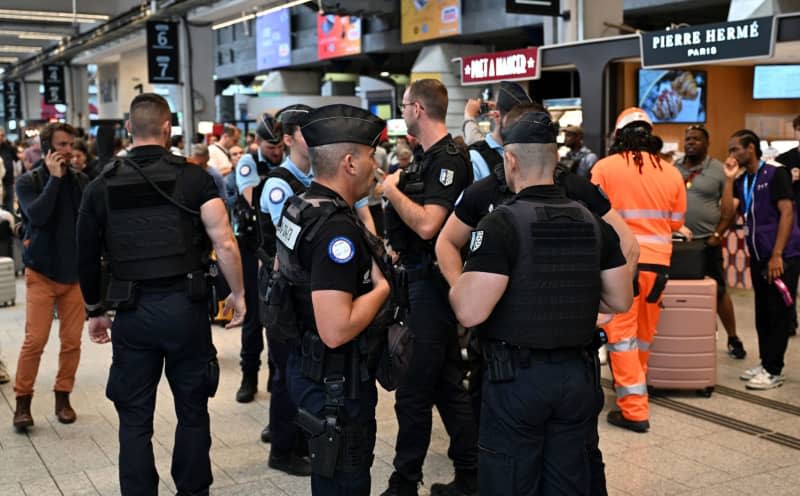Suspected arson attacks on the French rail network ahead of Friday’s opening of the Olympic Games, described by Prime Minister Gabriel Attal as “coordinated acts of sabotage,” have caused chaos and major disruption for travellers.
Unknown individuals placed incendiary devices at various key locations of the railway during the night, which has heightened the already significant fear of attacks in France.
By Friday afternoon, French national rail operator SNCF said it had made progress in repairing the damage and restoring high-speed service around the country but that cancellations continued on some lines and that delays would persist into the weekend.
Attal wrote on the social media platform X that the impacts from the “coordinated acts of sabotage” on the rail network on the day of the opening of the Olympic Games were massive and severe.
“Our intelligence services and law enforcement agencies are mobilized to find and punish the perpetrators of these criminal acts,” wrote Attal.
As many as 800,000 people have been affected by train cancellations as a result of the attacks, SNCF said.
An investigation will be launched on suspicion of damaging property that serves the fundamental interests of the nation, the Paris Public Prosecutor’s Office announced on Friday.
“SNCF was the victim of several simultaneous acts of malicious damage affecting the Atlantic, Northern and Eastern high-speed lines,” SNCF said.
The Atlantic Axis connects the south-west with Paris, the North Axis includes the Eurostar service towards the English Channel and London, and the East Axis connects with Strasbourg.
One in four Eurostar trains will be cancelled on Friday and over the weekend following the attack, the PA news agency reported.
The fires were set in Vergigny to the south-east of Paris, Courtalain to the south-west, Croisilles to the north and Pagny-sur-Moselle to the east, SNCF reported.
According to SNCF, an attack on the south-east axis was prevented.
On Friday afternoon, SNCF said that every third scheduled train on the high-speed line from Paris to the south-west was back to running again, but that traveller should prepare for delays of up to two hours.
On the high-speed line to the north, which is also used by trains from Cologne, London and Brussels, there are still isolated cancellations of trains as well as similar delays.
On the eastern line, trains between Paris and Nancy/Metz can run as planned again following repair work, SNCF said. On the eastward route from Paris to Strasbourg, there are still delays of around one hour and some train cancellations, according to SNCF.
On Saturday, trains on the eastern line towards Strasbourg and onwards to Germany are to run as planned again, SNCF said on Friday evening. This means that trains between Paris and Frankfurt/Main and Stuttgart will also run normally.
On the northbound route, 80% of the scheduled trains will run from Saturday, albeit with a delay of one to two hours. This is due to the fact that the high-speed line cannot yet be fully utilised again.
“We can assume that the attacks were planned and calculated,” SNCF head Jean-Pierre Farandou said. The locations of the fires correspond to junctions on the network, he said.
Transport Minister Patrice Vergriete and Attal, the prime minister, are currently serving in a caretaker capacity following snap elections a month ago. President Emmanuel Macron has said he will keep the outgoing government in office for the duration of the Olympics.
Security measures are being intensified, Paris Police Prefect Laurent Nuñez said on the website of broadcaster FranceInfo, with his force “concentrating its personnel on the Paris stations.”
German Chancellor Olaf Scholz, speaking at the German embassy in Paris, called the attack “absolutely condemnable.”
“To disrupt such a celebration of peace with acts of violence can never be accepted and demands the most resolute rejection,” Scholz said.
He hoped “that the French authorities will soon be successful in identifying the perpetrators.”
German Foreign Minister Annalena Baerbock, meanwhile, said authorities in both countries remain in coordination. She said that German police and security services are offering support to the French authorities throughout the Olympics, just as French police aided Germany during the recent European Football Championship tournament.
International Olympic Committee (IOC) president Thomas Bach said on Friday he was not worried about the security situation.
“We have full confidence in the French authorities,” Bach said, stressing that all necessary security measures have been taken. He also explained that France was being supported by more than 180 foreign intelligence services.
“The serious acts of sabotage on the French railway network show how serious the threat levels are currently in Europe and how important the strong security measures to protect the Olympic Games are,” German Interior Minister Nancy Faeser said on Friday ahead of the opening ceremony for the Summer Games in Paris.
The Olympics in Paris officially begin with a unique show in the middle of the Seine on Friday evening. For the first time in Summer Games history, the opening ceremony won’t be held in a stadium.
The unique event is being monitored by around 45,000 security personnel. The airspace within a 150-kilometre radius of Paris is to be closed for the evening. The areas along the Seine where the parade is taking place are extensively closed to vehicular traffic.









